Integrating Science and Practice of Nursing: Mental Health Report
VerifiedAdded on 2022/09/09
|19
|5814
|21
Report
AI Summary
This report presents a comprehensive analysis of a mental health nursing case study, focusing on an older adult patient named Peter, who experienced depression and anxiety. The report delves into the context of care, exploring the patient's emotional stressors, including the loss of his wife and social isolation. It examines the altered physiology associated with his mental health complications, emphasizing the connection between loneliness, depression, and anxiety. The impact of the health condition on Peter's quality of life is discussed, highlighting the limitations imposed by his mental state and the potential for co-morbidities. The report then outlines a plan of care, emphasizing the importance of a nursing model and interventions to address the patient's needs. This includes assessing and implementing strategies to improve the patient's mental well-being and quality of life. The report highlights the significance of patient-centered care, integrating theory, evidence, and policy to guide the care process. Finally, the report reflects on the maintenance of service user values such as care, compassion, privacy and dignity throughout the care delivery process.
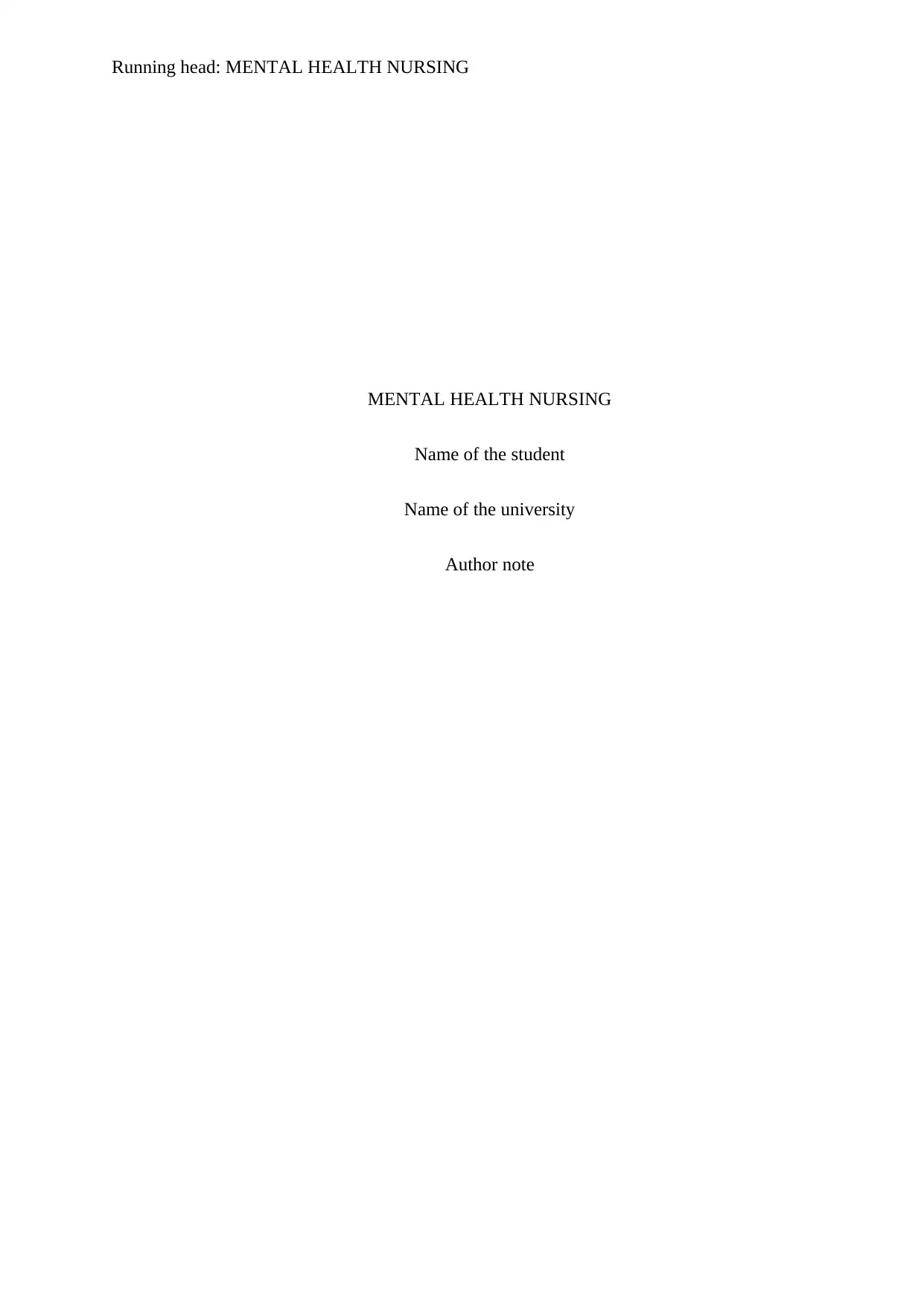
Running head: MENTAL HEALTH NURSING
MENTAL HEALTH NURSING
Name of the student
Name of the university
Author note
MENTAL HEALTH NURSING
Name of the student
Name of the university
Author note
Paraphrase This Document
Need a fresh take? Get an instant paraphrase of this document with our AI Paraphraser
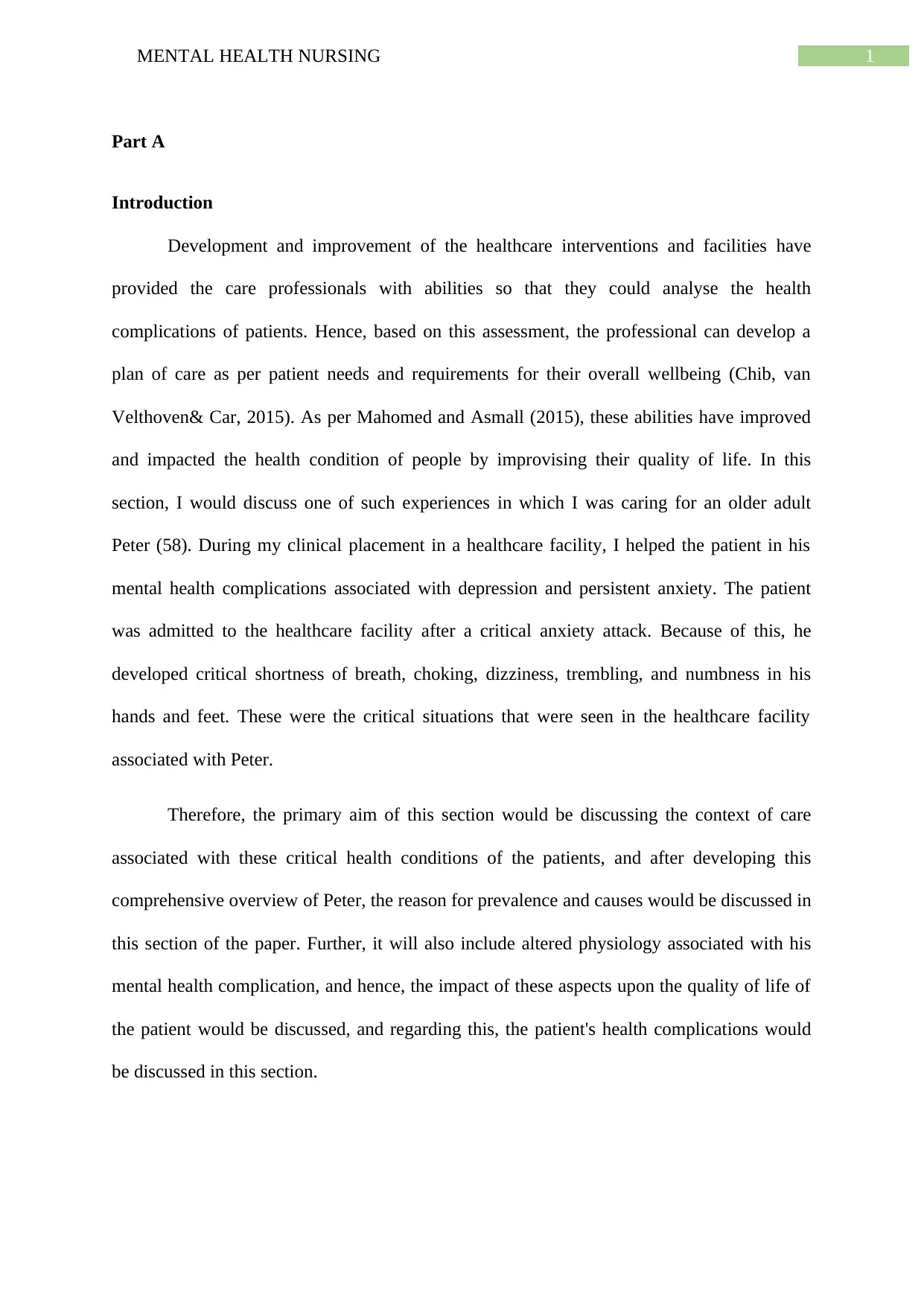
1MENTAL HEALTH NURSING
Part A
Introduction
Development and improvement of the healthcare interventions and facilities have
provided the care professionals with abilities so that they could analyse the health
complications of patients. Hence, based on this assessment, the professional can develop a
plan of care as per patient needs and requirements for their overall wellbeing (Chib, van
Velthoven& Car, 2015). As per Mahomed and Asmall (2015), these abilities have improved
and impacted the health condition of people by improvising their quality of life. In this
section, I would discuss one of such experiences in which I was caring for an older adult
Peter (58). During my clinical placement in a healthcare facility, I helped the patient in his
mental health complications associated with depression and persistent anxiety. The patient
was admitted to the healthcare facility after a critical anxiety attack. Because of this, he
developed critical shortness of breath, choking, dizziness, trembling, and numbness in his
hands and feet. These were the critical situations that were seen in the healthcare facility
associated with Peter.
Therefore, the primary aim of this section would be discussing the context of care
associated with these critical health conditions of the patients, and after developing this
comprehensive overview of Peter, the reason for prevalence and causes would be discussed in
this section of the paper. Further, it will also include altered physiology associated with his
mental health complication, and hence, the impact of these aspects upon the quality of life of
the patient would be discussed, and regarding this, the patient's health complications would
be discussed in this section.
Part A
Introduction
Development and improvement of the healthcare interventions and facilities have
provided the care professionals with abilities so that they could analyse the health
complications of patients. Hence, based on this assessment, the professional can develop a
plan of care as per patient needs and requirements for their overall wellbeing (Chib, van
Velthoven& Car, 2015). As per Mahomed and Asmall (2015), these abilities have improved
and impacted the health condition of people by improvising their quality of life. In this
section, I would discuss one of such experiences in which I was caring for an older adult
Peter (58). During my clinical placement in a healthcare facility, I helped the patient in his
mental health complications associated with depression and persistent anxiety. The patient
was admitted to the healthcare facility after a critical anxiety attack. Because of this, he
developed critical shortness of breath, choking, dizziness, trembling, and numbness in his
hands and feet. These were the critical situations that were seen in the healthcare facility
associated with Peter.
Therefore, the primary aim of this section would be discussing the context of care
associated with these critical health conditions of the patients, and after developing this
comprehensive overview of Peter, the reason for prevalence and causes would be discussed in
this section of the paper. Further, it will also include altered physiology associated with his
mental health complication, and hence, the impact of these aspects upon the quality of life of
the patient would be discussed, and regarding this, the patient's health complications would
be discussed in this section.
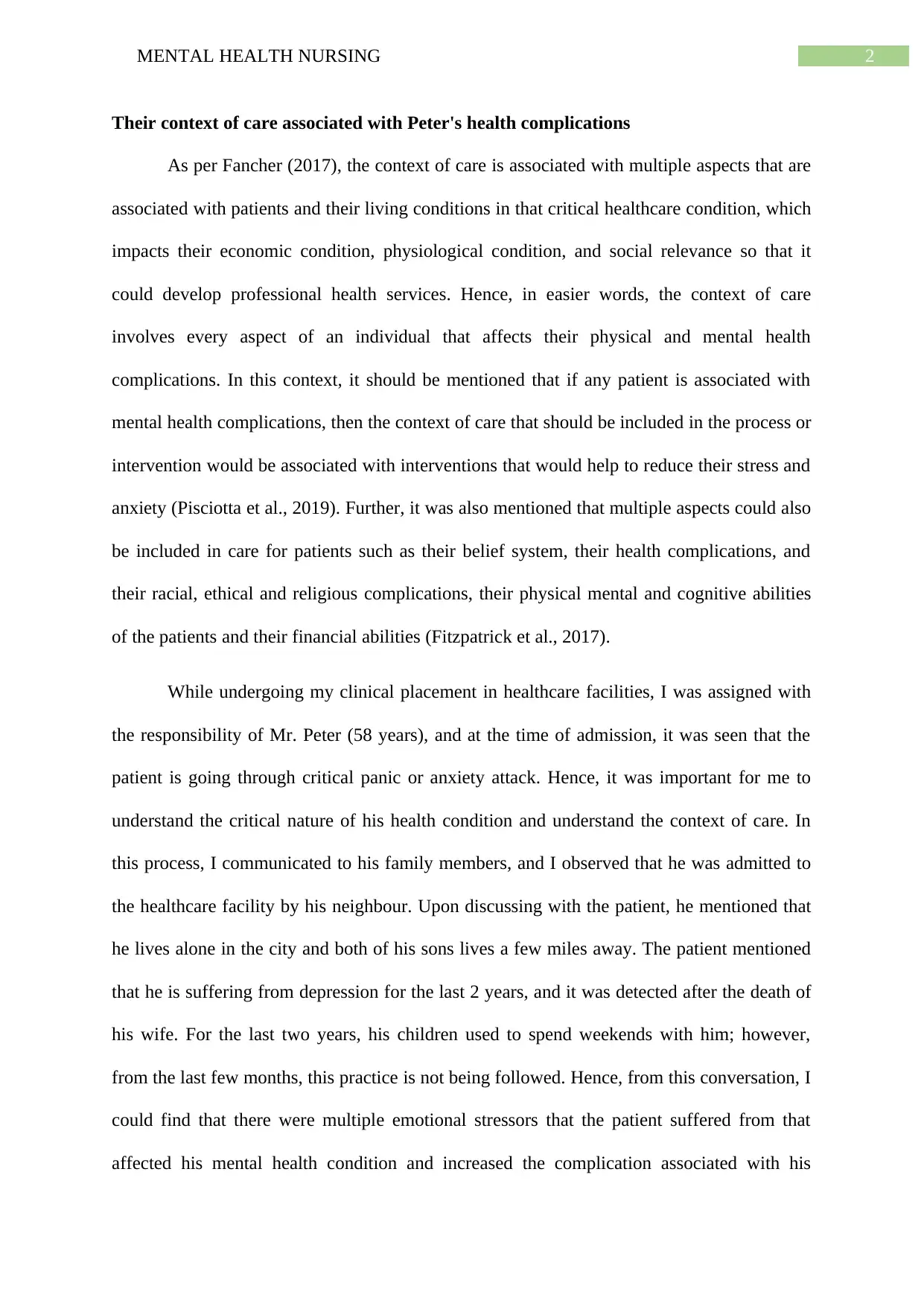
2MENTAL HEALTH NURSING
Their context of care associated with Peter's health complications
As per Fancher (2017), the context of care is associated with multiple aspects that are
associated with patients and their living conditions in that critical healthcare condition, which
impacts their economic condition, physiological condition, and social relevance so that it
could develop professional health services. Hence, in easier words, the context of care
involves every aspect of an individual that affects their physical and mental health
complications. In this context, it should be mentioned that if any patient is associated with
mental health complications, then the context of care that should be included in the process or
intervention would be associated with interventions that would help to reduce their stress and
anxiety (Pisciotta et al., 2019). Further, it was also mentioned that multiple aspects could also
be included in care for patients such as their belief system, their health complications, and
their racial, ethical and religious complications, their physical mental and cognitive abilities
of the patients and their financial abilities (Fitzpatrick et al., 2017).
While undergoing my clinical placement in healthcare facilities, I was assigned with
the responsibility of Mr. Peter (58 years), and at the time of admission, it was seen that the
patient is going through critical panic or anxiety attack. Hence, it was important for me to
understand the critical nature of his health condition and understand the context of care. In
this process, I communicated to his family members, and I observed that he was admitted to
the healthcare facility by his neighbour. Upon discussing with the patient, he mentioned that
he lives alone in the city and both of his sons lives a few miles away. The patient mentioned
that he is suffering from depression for the last 2 years, and it was detected after the death of
his wife. For the last two years, his children used to spend weekends with him; however,
from the last few months, this practice is not being followed. Hence, from this conversation, I
could find that there were multiple emotional stressors that the patient suffered from that
affected his mental health condition and increased the complication associated with his
Their context of care associated with Peter's health complications
As per Fancher (2017), the context of care is associated with multiple aspects that are
associated with patients and their living conditions in that critical healthcare condition, which
impacts their economic condition, physiological condition, and social relevance so that it
could develop professional health services. Hence, in easier words, the context of care
involves every aspect of an individual that affects their physical and mental health
complications. In this context, it should be mentioned that if any patient is associated with
mental health complications, then the context of care that should be included in the process or
intervention would be associated with interventions that would help to reduce their stress and
anxiety (Pisciotta et al., 2019). Further, it was also mentioned that multiple aspects could also
be included in care for patients such as their belief system, their health complications, and
their racial, ethical and religious complications, their physical mental and cognitive abilities
of the patients and their financial abilities (Fitzpatrick et al., 2017).
While undergoing my clinical placement in healthcare facilities, I was assigned with
the responsibility of Mr. Peter (58 years), and at the time of admission, it was seen that the
patient is going through critical panic or anxiety attack. Hence, it was important for me to
understand the critical nature of his health condition and understand the context of care. In
this process, I communicated to his family members, and I observed that he was admitted to
the healthcare facility by his neighbour. Upon discussing with the patient, he mentioned that
he lives alone in the city and both of his sons lives a few miles away. The patient mentioned
that he is suffering from depression for the last 2 years, and it was detected after the death of
his wife. For the last two years, his children used to spend weekends with him; however,
from the last few months, this practice is not being followed. Hence, from this conversation, I
could find that there were multiple emotional stressors that the patient suffered from that
affected his mental health condition and increased the complication associated with his
⊘ This is a preview!⊘
Do you want full access?
Subscribe today to unlock all pages.

Trusted by 1+ million students worldwide
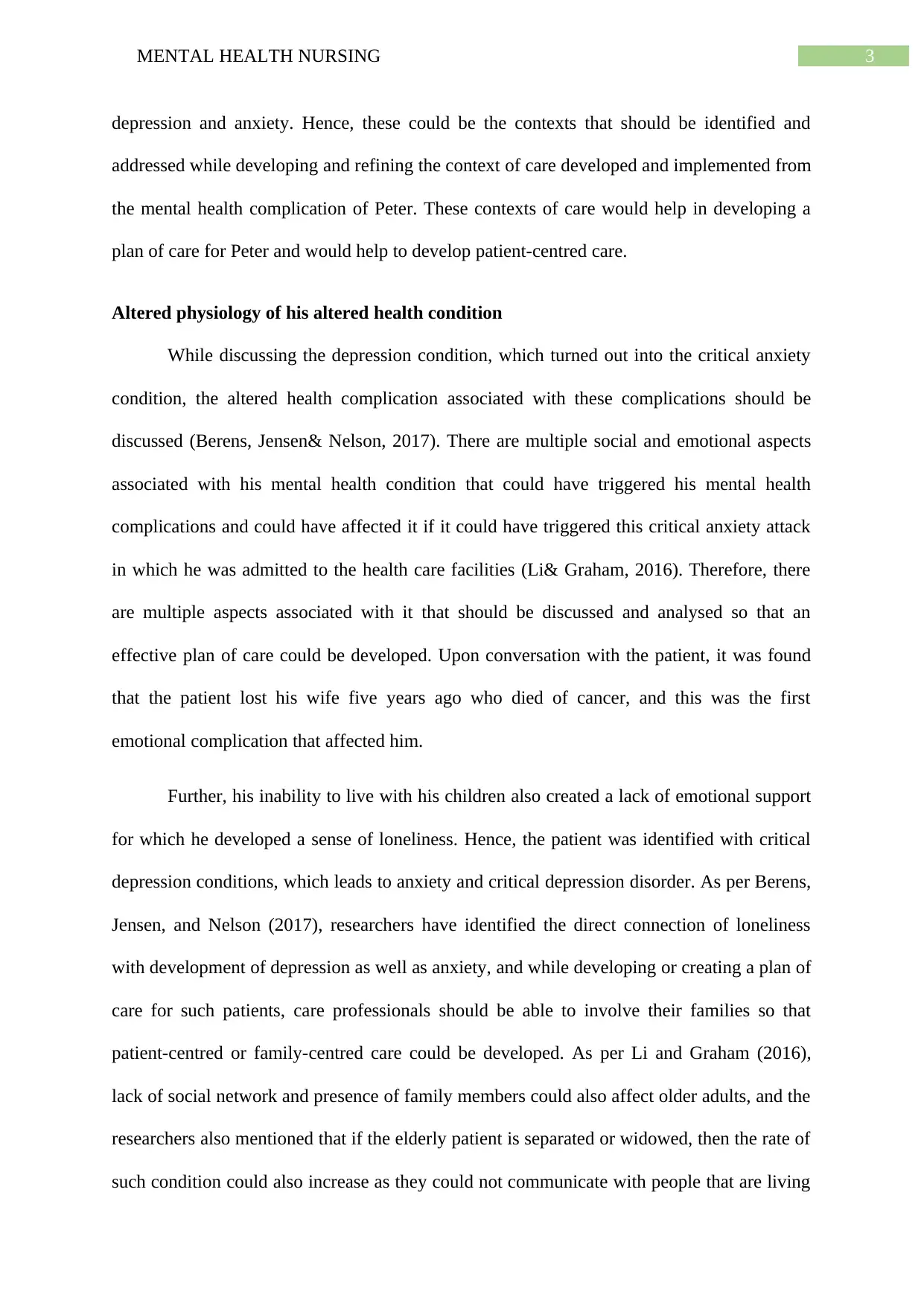
3MENTAL HEALTH NURSING
depression and anxiety. Hence, these could be the contexts that should be identified and
addressed while developing and refining the context of care developed and implemented from
the mental health complication of Peter. These contexts of care would help in developing a
plan of care for Peter and would help to develop patient-centred care.
Altered physiology of his altered health condition
While discussing the depression condition, which turned out into the critical anxiety
condition, the altered health complication associated with these complications should be
discussed (Berens, Jensen& Nelson, 2017). There are multiple social and emotional aspects
associated with his mental health condition that could have triggered his mental health
complications and could have affected it if it could have triggered this critical anxiety attack
in which he was admitted to the health care facilities (Li& Graham, 2016). Therefore, there
are multiple aspects associated with it that should be discussed and analysed so that an
effective plan of care could be developed. Upon conversation with the patient, it was found
that the patient lost his wife five years ago who died of cancer, and this was the first
emotional complication that affected him.
Further, his inability to live with his children also created a lack of emotional support
for which he developed a sense of loneliness. Hence, the patient was identified with critical
depression conditions, which leads to anxiety and critical depression disorder. As per Berens,
Jensen, and Nelson (2017), researchers have identified the direct connection of loneliness
with development of depression as well as anxiety, and while developing or creating a plan of
care for such patients, care professionals should be able to involve their families so that
patient-centred or family-centred care could be developed. As per Li and Graham (2016),
lack of social network and presence of family members could also affect older adults, and the
researchers also mentioned that if the elderly patient is separated or widowed, then the rate of
such condition could also increase as they could not communicate with people that are living
depression and anxiety. Hence, these could be the contexts that should be identified and
addressed while developing and refining the context of care developed and implemented from
the mental health complication of Peter. These contexts of care would help in developing a
plan of care for Peter and would help to develop patient-centred care.
Altered physiology of his altered health condition
While discussing the depression condition, which turned out into the critical anxiety
condition, the altered health complication associated with these complications should be
discussed (Berens, Jensen& Nelson, 2017). There are multiple social and emotional aspects
associated with his mental health condition that could have triggered his mental health
complications and could have affected it if it could have triggered this critical anxiety attack
in which he was admitted to the health care facilities (Li& Graham, 2016). Therefore, there
are multiple aspects associated with it that should be discussed and analysed so that an
effective plan of care could be developed. Upon conversation with the patient, it was found
that the patient lost his wife five years ago who died of cancer, and this was the first
emotional complication that affected him.
Further, his inability to live with his children also created a lack of emotional support
for which he developed a sense of loneliness. Hence, the patient was identified with critical
depression conditions, which leads to anxiety and critical depression disorder. As per Berens,
Jensen, and Nelson (2017), researchers have identified the direct connection of loneliness
with development of depression as well as anxiety, and while developing or creating a plan of
care for such patients, care professionals should be able to involve their families so that
patient-centred or family-centred care could be developed. As per Li and Graham (2016),
lack of social network and presence of family members could also affect older adults, and the
researchers also mentioned that if the elderly patient is separated or widowed, then the rate of
such condition could also increase as they could not communicate with people that are living
Paraphrase This Document
Need a fresh take? Get an instant paraphrase of this document with our AI Paraphraser
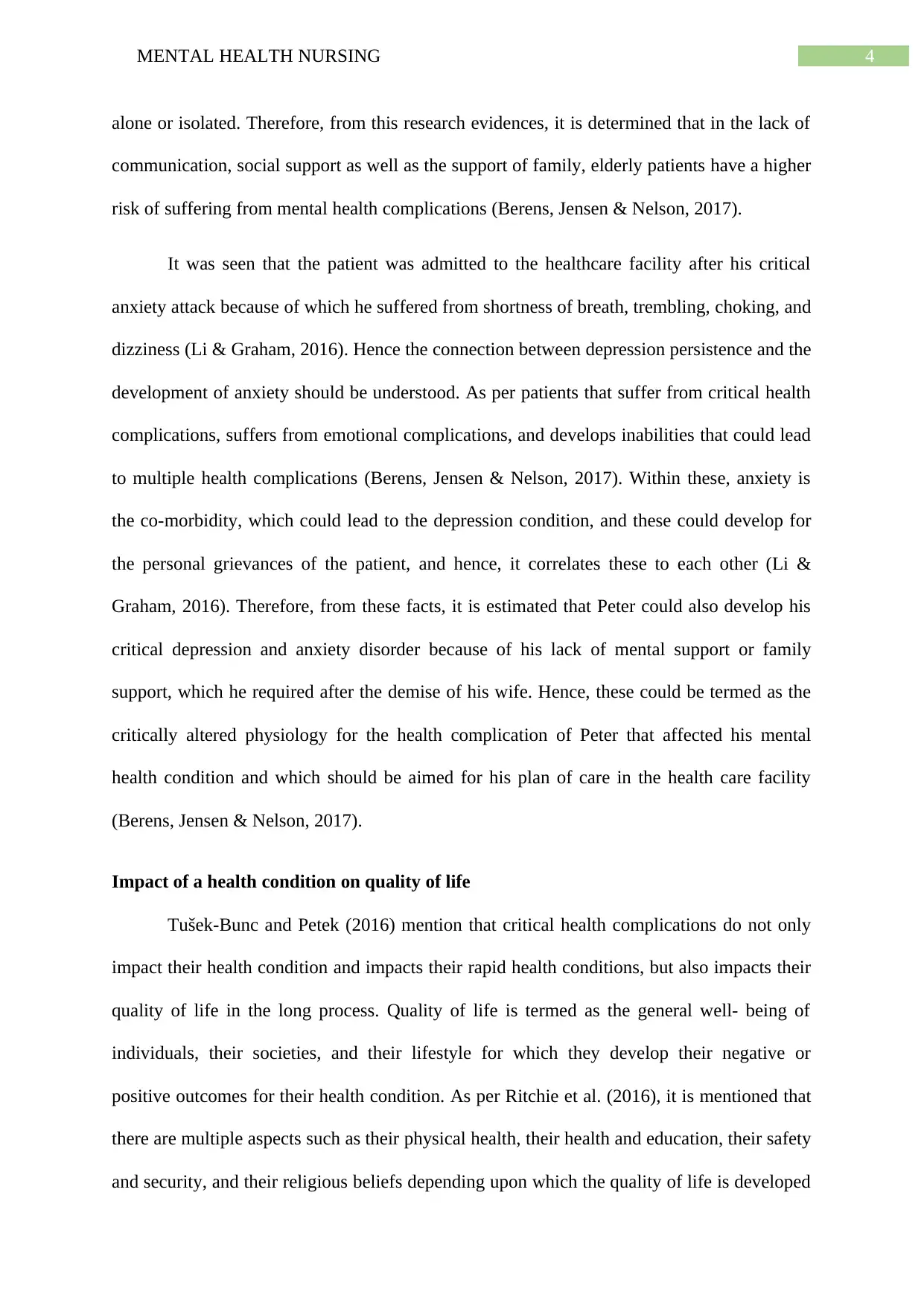
4MENTAL HEALTH NURSING
alone or isolated. Therefore, from this research evidences, it is determined that in the lack of
communication, social support as well as the support of family, elderly patients have a higher
risk of suffering from mental health complications (Berens, Jensen & Nelson, 2017).
It was seen that the patient was admitted to the healthcare facility after his critical
anxiety attack because of which he suffered from shortness of breath, trembling, choking, and
dizziness (Li & Graham, 2016). Hence the connection between depression persistence and the
development of anxiety should be understood. As per patients that suffer from critical health
complications, suffers from emotional complications, and develops inabilities that could lead
to multiple health complications (Berens, Jensen & Nelson, 2017). Within these, anxiety is
the co-morbidity, which could lead to the depression condition, and these could develop for
the personal grievances of the patient, and hence, it correlates these to each other (Li &
Graham, 2016). Therefore, from these facts, it is estimated that Peter could also develop his
critical depression and anxiety disorder because of his lack of mental support or family
support, which he required after the demise of his wife. Hence, these could be termed as the
critically altered physiology for the health complication of Peter that affected his mental
health condition and which should be aimed for his plan of care in the health care facility
(Berens, Jensen & Nelson, 2017).
Impact of a health condition on quality of life
Tušek-Bunc and Petek (2016) mention that critical health complications do not only
impact their health condition and impacts their rapid health conditions, but also impacts their
quality of life in the long process. Quality of life is termed as the general well- being of
individuals, their societies, and their lifestyle for which they develop their negative or
positive outcomes for their health condition. As per Ritchie et al. (2016), it is mentioned that
there are multiple aspects such as their physical health, their health and education, their safety
and security, and their religious beliefs depending upon which the quality of life is developed
alone or isolated. Therefore, from this research evidences, it is determined that in the lack of
communication, social support as well as the support of family, elderly patients have a higher
risk of suffering from mental health complications (Berens, Jensen & Nelson, 2017).
It was seen that the patient was admitted to the healthcare facility after his critical
anxiety attack because of which he suffered from shortness of breath, trembling, choking, and
dizziness (Li & Graham, 2016). Hence the connection between depression persistence and the
development of anxiety should be understood. As per patients that suffer from critical health
complications, suffers from emotional complications, and develops inabilities that could lead
to multiple health complications (Berens, Jensen & Nelson, 2017). Within these, anxiety is
the co-morbidity, which could lead to the depression condition, and these could develop for
the personal grievances of the patient, and hence, it correlates these to each other (Li &
Graham, 2016). Therefore, from these facts, it is estimated that Peter could also develop his
critical depression and anxiety disorder because of his lack of mental support or family
support, which he required after the demise of his wife. Hence, these could be termed as the
critically altered physiology for the health complication of Peter that affected his mental
health condition and which should be aimed for his plan of care in the health care facility
(Berens, Jensen & Nelson, 2017).
Impact of a health condition on quality of life
Tušek-Bunc and Petek (2016) mention that critical health complications do not only
impact their health condition and impacts their rapid health conditions, but also impacts their
quality of life in the long process. Quality of life is termed as the general well- being of
individuals, their societies, and their lifestyle for which they develop their negative or
positive outcomes for their health condition. As per Ritchie et al. (2016), it is mentioned that
there are multiple aspects such as their physical health, their health and education, their safety
and security, and their religious beliefs depending upon which the quality of life is developed
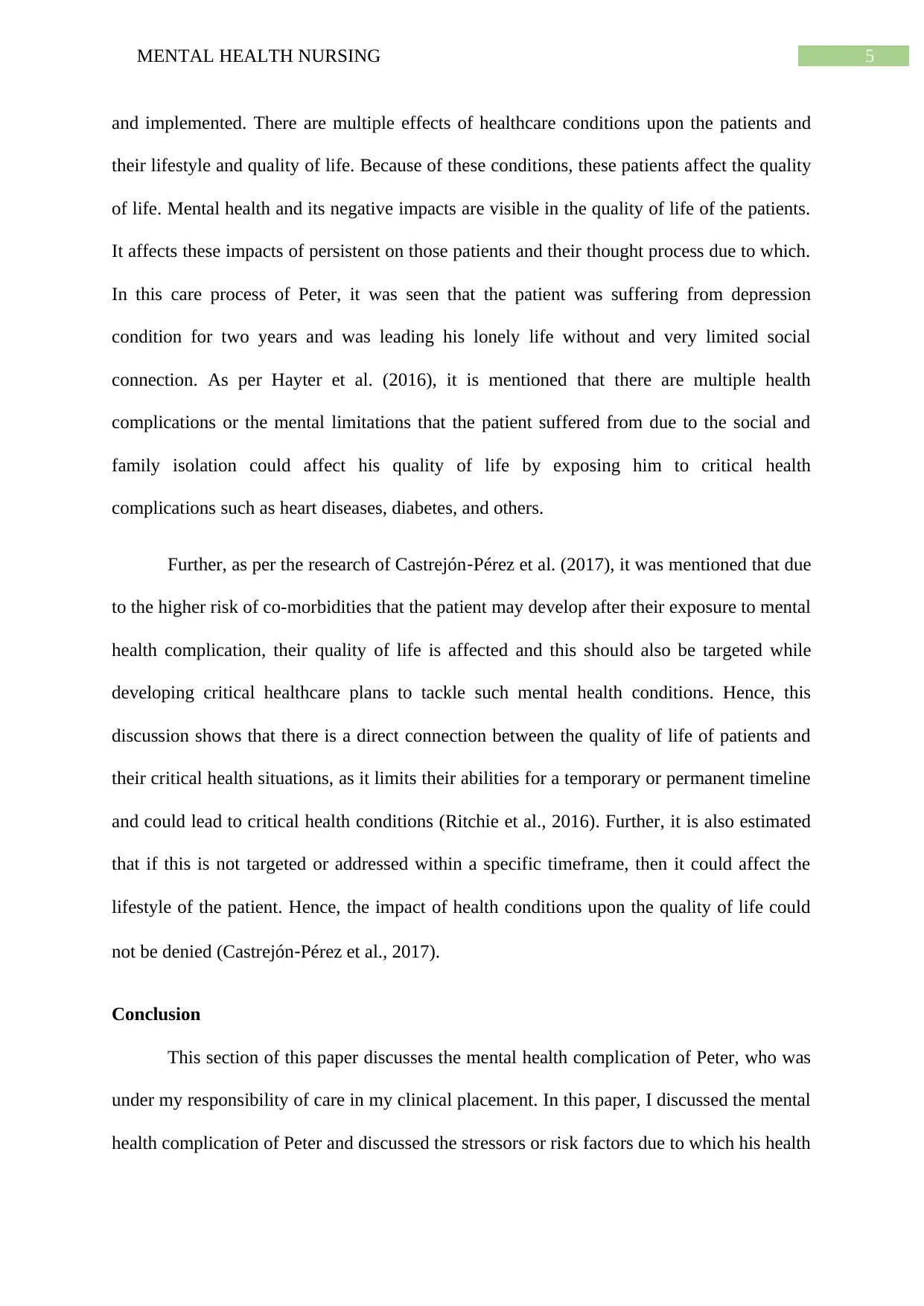
5MENTAL HEALTH NURSING
and implemented. There are multiple effects of healthcare conditions upon the patients and
their lifestyle and quality of life. Because of these conditions, these patients affect the quality
of life. Mental health and its negative impacts are visible in the quality of life of the patients.
It affects these impacts of persistent on those patients and their thought process due to which.
In this care process of Peter, it was seen that the patient was suffering from depression
condition for two years and was leading his lonely life without and very limited social
connection. As per Hayter et al. (2016), it is mentioned that there are multiple health
complications or the mental limitations that the patient suffered from due to the social and
family isolation could affect his quality of life by exposing him to critical health
complications such as heart diseases, diabetes, and others.
Further, as per the research of Castrejón‐Pérez et al. (2017), it was mentioned that due
to the higher risk of co-morbidities that the patient may develop after their exposure to mental
health complication, their quality of life is affected and this should also be targeted while
developing critical healthcare plans to tackle such mental health conditions. Hence, this
discussion shows that there is a direct connection between the quality of life of patients and
their critical health situations, as it limits their abilities for a temporary or permanent timeline
and could lead to critical health conditions (Ritchie et al., 2016). Further, it is also estimated
that if this is not targeted or addressed within a specific timeframe, then it could affect the
lifestyle of the patient. Hence, the impact of health conditions upon the quality of life could
not be denied (Castrejón‐Pérez et al., 2017).
Conclusion
This section of this paper discusses the mental health complication of Peter, who was
under my responsibility of care in my clinical placement. In this paper, I discussed the mental
health complication of Peter and discussed the stressors or risk factors due to which his health
and implemented. There are multiple effects of healthcare conditions upon the patients and
their lifestyle and quality of life. Because of these conditions, these patients affect the quality
of life. Mental health and its negative impacts are visible in the quality of life of the patients.
It affects these impacts of persistent on those patients and their thought process due to which.
In this care process of Peter, it was seen that the patient was suffering from depression
condition for two years and was leading his lonely life without and very limited social
connection. As per Hayter et al. (2016), it is mentioned that there are multiple health
complications or the mental limitations that the patient suffered from due to the social and
family isolation could affect his quality of life by exposing him to critical health
complications such as heart diseases, diabetes, and others.
Further, as per the research of Castrejón‐Pérez et al. (2017), it was mentioned that due
to the higher risk of co-morbidities that the patient may develop after their exposure to mental
health complication, their quality of life is affected and this should also be targeted while
developing critical healthcare plans to tackle such mental health conditions. Hence, this
discussion shows that there is a direct connection between the quality of life of patients and
their critical health situations, as it limits their abilities for a temporary or permanent timeline
and could lead to critical health conditions (Ritchie et al., 2016). Further, it is also estimated
that if this is not targeted or addressed within a specific timeframe, then it could affect the
lifestyle of the patient. Hence, the impact of health conditions upon the quality of life could
not be denied (Castrejón‐Pérez et al., 2017).
Conclusion
This section of this paper discusses the mental health complication of Peter, who was
under my responsibility of care in my clinical placement. In this paper, I discussed the mental
health complication of Peter and discussed the stressors or risk factors due to which his health
⊘ This is a preview!⊘
Do you want full access?
Subscribe today to unlock all pages.

Trusted by 1+ million students worldwide
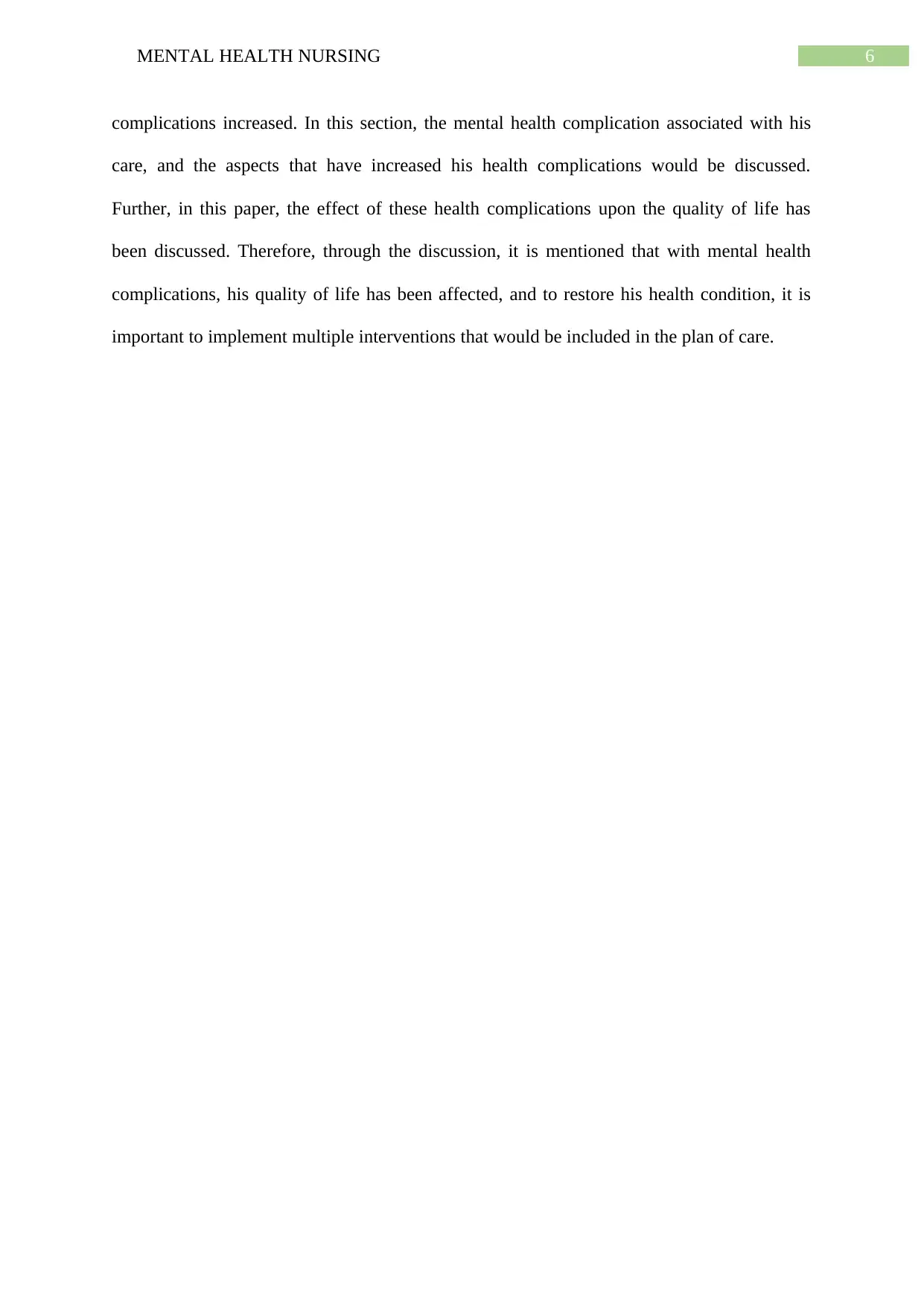
6MENTAL HEALTH NURSING
complications increased. In this section, the mental health complication associated with his
care, and the aspects that have increased his health complications would be discussed.
Further, in this paper, the effect of these health complications upon the quality of life has
been discussed. Therefore, through the discussion, it is mentioned that with mental health
complications, his quality of life has been affected, and to restore his health condition, it is
important to implement multiple interventions that would be included in the plan of care.
complications increased. In this section, the mental health complication associated with his
care, and the aspects that have increased his health complications would be discussed.
Further, in this paper, the effect of these health complications upon the quality of life has
been discussed. Therefore, through the discussion, it is mentioned that with mental health
complications, his quality of life has been affected, and to restore his health condition, it is
important to implement multiple interventions that would be included in the plan of care.
Paraphrase This Document
Need a fresh take? Get an instant paraphrase of this document with our AI Paraphraser
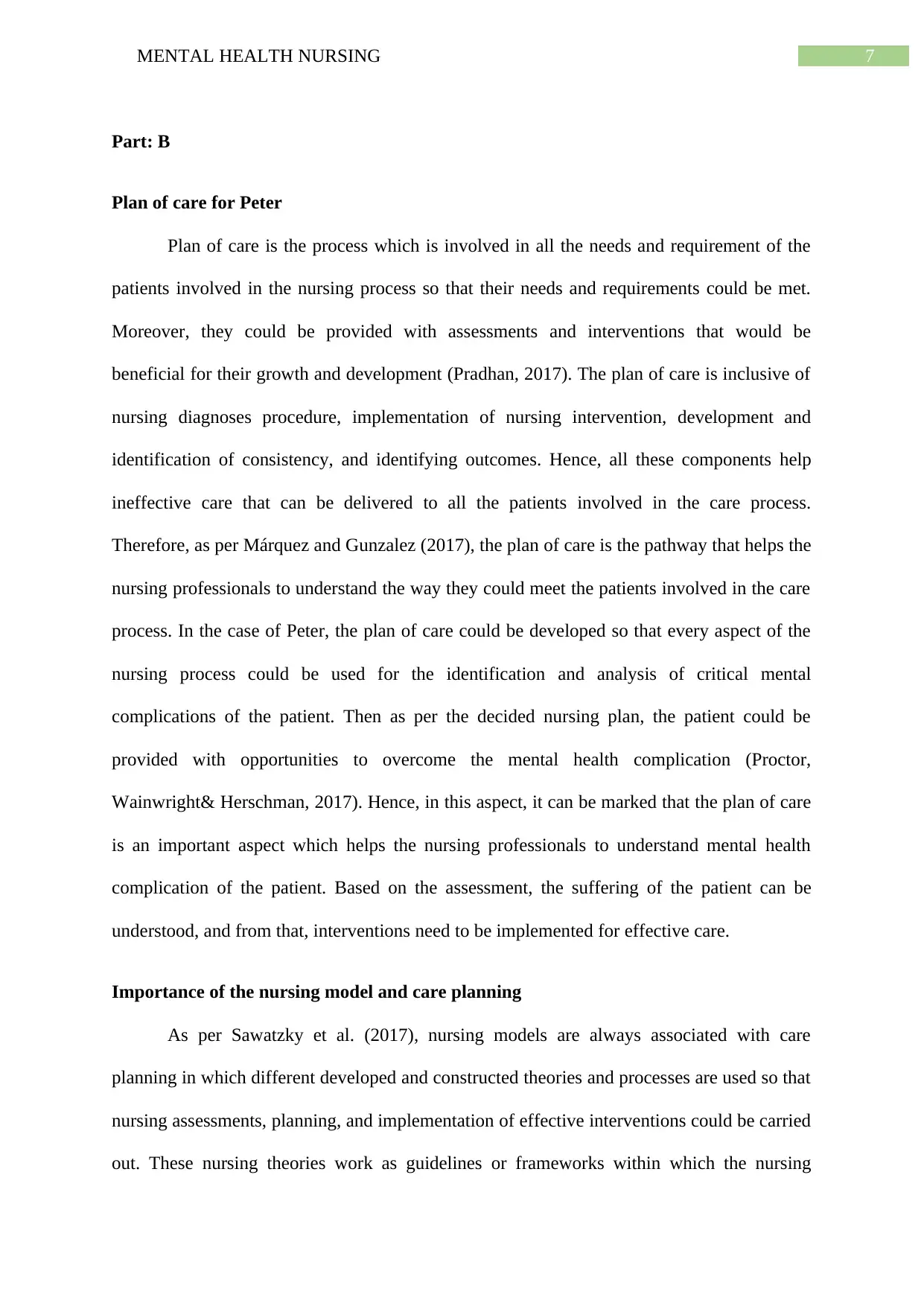
7MENTAL HEALTH NURSING
Part: B
Plan of care for Peter
Plan of care is the process which is involved in all the needs and requirement of the
patients involved in the nursing process so that their needs and requirements could be met.
Moreover, they could be provided with assessments and interventions that would be
beneficial for their growth and development (Pradhan, 2017). The plan of care is inclusive of
nursing diagnoses procedure, implementation of nursing intervention, development and
identification of consistency, and identifying outcomes. Hence, all these components help
ineffective care that can be delivered to all the patients involved in the care process.
Therefore, as per Márquez and Gunzalez (2017), the plan of care is the pathway that helps the
nursing professionals to understand the way they could meet the patients involved in the care
process. In the case of Peter, the plan of care could be developed so that every aspect of the
nursing process could be used for the identification and analysis of critical mental
complications of the patient. Then as per the decided nursing plan, the patient could be
provided with opportunities to overcome the mental health complication (Proctor,
Wainwright& Herschman, 2017). Hence, in this aspect, it can be marked that the plan of care
is an important aspect which helps the nursing professionals to understand mental health
complication of the patient. Based on the assessment, the suffering of the patient can be
understood, and from that, interventions need to be implemented for effective care.
Importance of the nursing model and care planning
As per Sawatzky et al. (2017), nursing models are always associated with care
planning in which different developed and constructed theories and processes are used so that
nursing assessments, planning, and implementation of effective interventions could be carried
out. These nursing theories work as guidelines or frameworks within which the nursing
Part: B
Plan of care for Peter
Plan of care is the process which is involved in all the needs and requirement of the
patients involved in the nursing process so that their needs and requirements could be met.
Moreover, they could be provided with assessments and interventions that would be
beneficial for their growth and development (Pradhan, 2017). The plan of care is inclusive of
nursing diagnoses procedure, implementation of nursing intervention, development and
identification of consistency, and identifying outcomes. Hence, all these components help
ineffective care that can be delivered to all the patients involved in the care process.
Therefore, as per Márquez and Gunzalez (2017), the plan of care is the pathway that helps the
nursing professionals to understand the way they could meet the patients involved in the care
process. In the case of Peter, the plan of care could be developed so that every aspect of the
nursing process could be used for the identification and analysis of critical mental
complications of the patient. Then as per the decided nursing plan, the patient could be
provided with opportunities to overcome the mental health complication (Proctor,
Wainwright& Herschman, 2017). Hence, in this aspect, it can be marked that the plan of care
is an important aspect which helps the nursing professionals to understand mental health
complication of the patient. Based on the assessment, the suffering of the patient can be
understood, and from that, interventions need to be implemented for effective care.
Importance of the nursing model and care planning
As per Sawatzky et al. (2017), nursing models are always associated with care
planning in which different developed and constructed theories and processes are used so that
nursing assessments, planning, and implementation of effective interventions could be carried
out. These nursing theories work as guidelines or frameworks within which the nursing
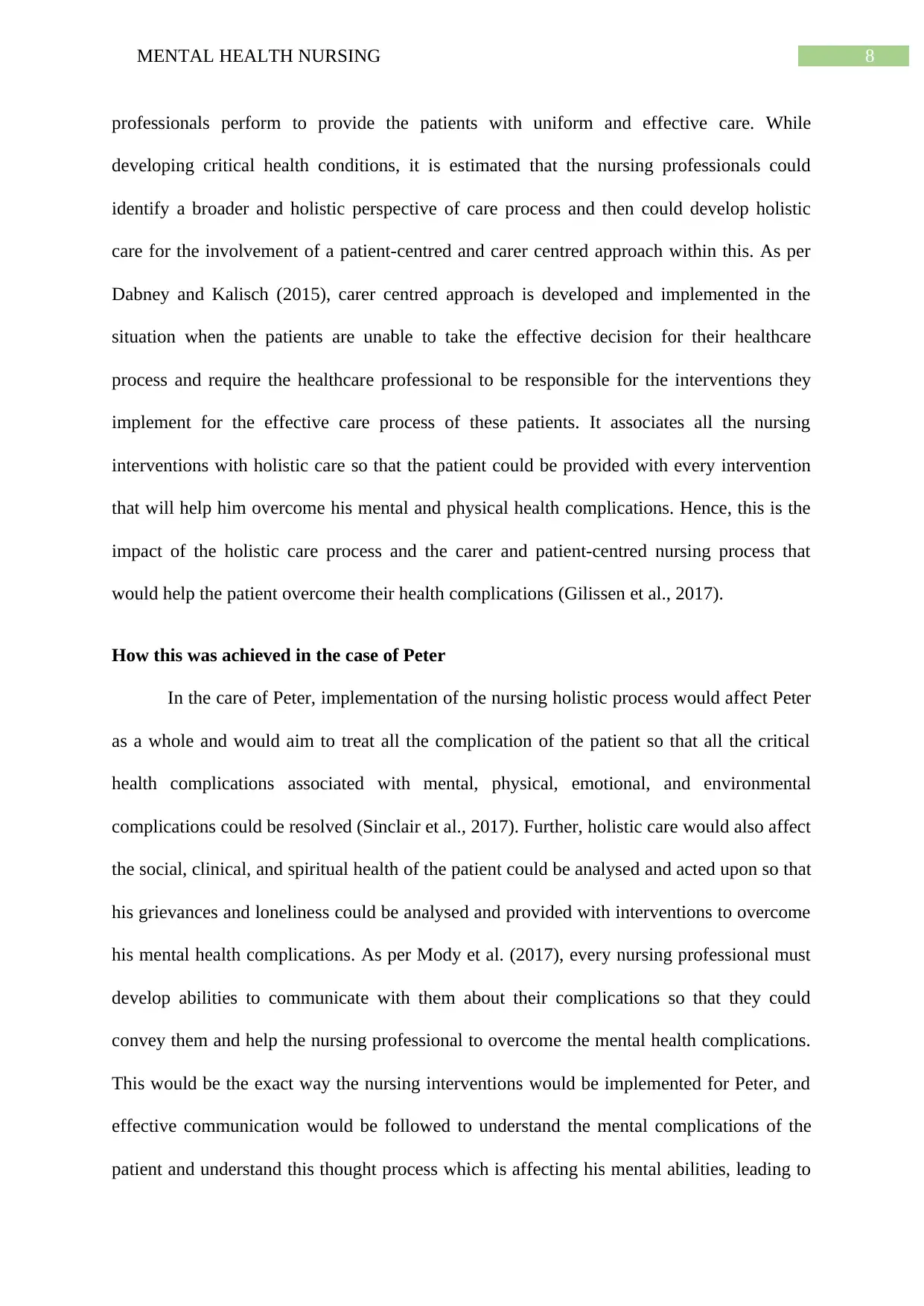
8MENTAL HEALTH NURSING
professionals perform to provide the patients with uniform and effective care. While
developing critical health conditions, it is estimated that the nursing professionals could
identify a broader and holistic perspective of care process and then could develop holistic
care for the involvement of a patient-centred and carer centred approach within this. As per
Dabney and Kalisch (2015), carer centred approach is developed and implemented in the
situation when the patients are unable to take the effective decision for their healthcare
process and require the healthcare professional to be responsible for the interventions they
implement for the effective care process of these patients. It associates all the nursing
interventions with holistic care so that the patient could be provided with every intervention
that will help him overcome his mental and physical health complications. Hence, this is the
impact of the holistic care process and the carer and patient-centred nursing process that
would help the patient overcome their health complications (Gilissen et al., 2017).
How this was achieved in the case of Peter
In the care of Peter, implementation of the nursing holistic process would affect Peter
as a whole and would aim to treat all the complication of the patient so that all the critical
health complications associated with mental, physical, emotional, and environmental
complications could be resolved (Sinclair et al., 2017). Further, holistic care would also affect
the social, clinical, and spiritual health of the patient could be analysed and acted upon so that
his grievances and loneliness could be analysed and provided with interventions to overcome
his mental health complications. As per Mody et al. (2017), every nursing professional must
develop abilities to communicate with them about their complications so that they could
convey them and help the nursing professional to overcome the mental health complications.
This would be the exact way the nursing interventions would be implemented for Peter, and
effective communication would be followed to understand the mental complications of the
patient and understand this thought process which is affecting his mental abilities, leading to
professionals perform to provide the patients with uniform and effective care. While
developing critical health conditions, it is estimated that the nursing professionals could
identify a broader and holistic perspective of care process and then could develop holistic
care for the involvement of a patient-centred and carer centred approach within this. As per
Dabney and Kalisch (2015), carer centred approach is developed and implemented in the
situation when the patients are unable to take the effective decision for their healthcare
process and require the healthcare professional to be responsible for the interventions they
implement for the effective care process of these patients. It associates all the nursing
interventions with holistic care so that the patient could be provided with every intervention
that will help him overcome his mental and physical health complications. Hence, this is the
impact of the holistic care process and the carer and patient-centred nursing process that
would help the patient overcome their health complications (Gilissen et al., 2017).
How this was achieved in the case of Peter
In the care of Peter, implementation of the nursing holistic process would affect Peter
as a whole and would aim to treat all the complication of the patient so that all the critical
health complications associated with mental, physical, emotional, and environmental
complications could be resolved (Sinclair et al., 2017). Further, holistic care would also affect
the social, clinical, and spiritual health of the patient could be analysed and acted upon so that
his grievances and loneliness could be analysed and provided with interventions to overcome
his mental health complications. As per Mody et al. (2017), every nursing professional must
develop abilities to communicate with them about their complications so that they could
convey them and help the nursing professional to overcome the mental health complications.
This would be the exact way the nursing interventions would be implemented for Peter, and
effective communication would be followed to understand the mental complications of the
patient and understand this thought process which is affecting his mental abilities, leading to
⊘ This is a preview!⊘
Do you want full access?
Subscribe today to unlock all pages.

Trusted by 1+ million students worldwide
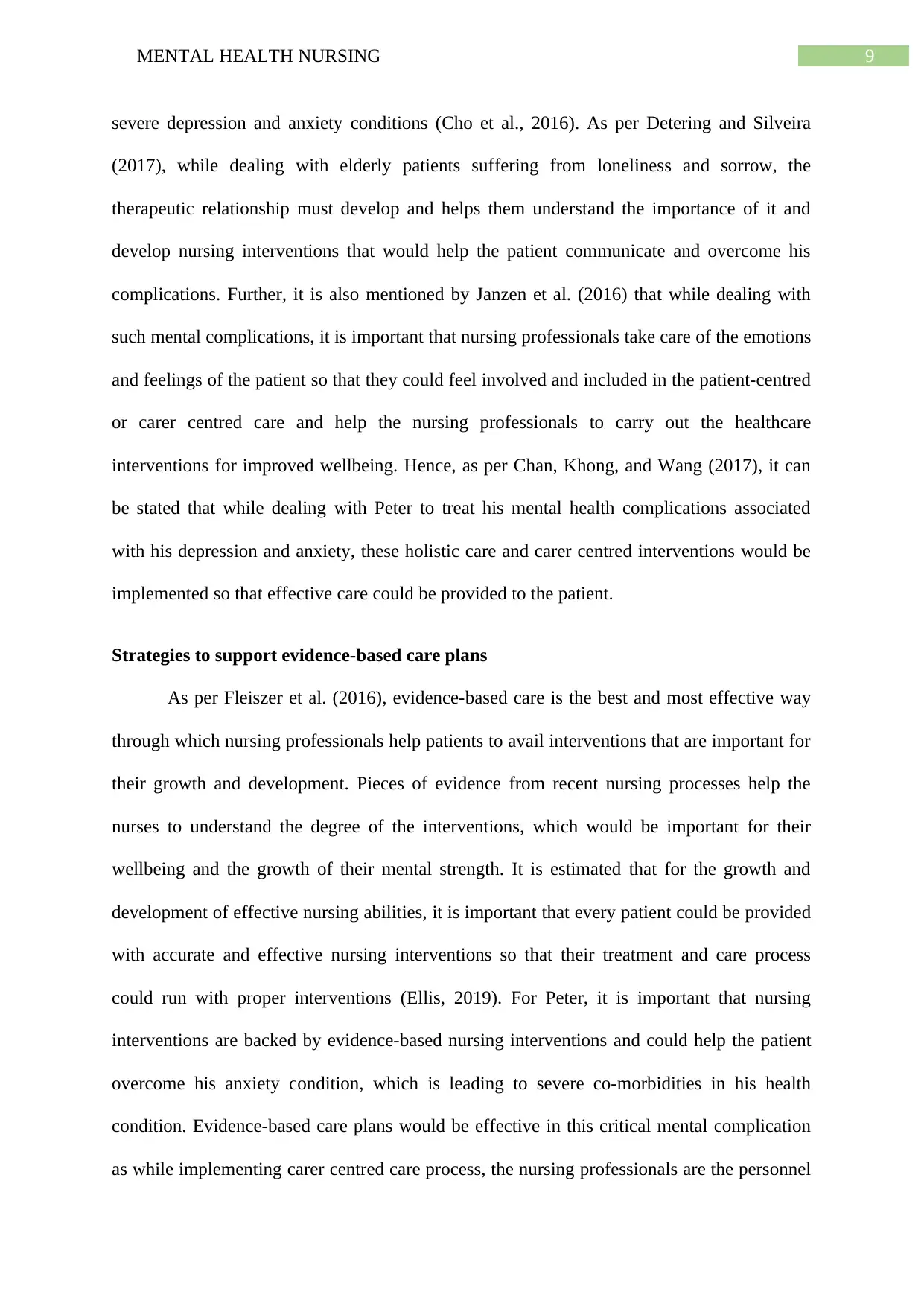
9MENTAL HEALTH NURSING
severe depression and anxiety conditions (Cho et al., 2016). As per Detering and Silveira
(2017), while dealing with elderly patients suffering from loneliness and sorrow, the
therapeutic relationship must develop and helps them understand the importance of it and
develop nursing interventions that would help the patient communicate and overcome his
complications. Further, it is also mentioned by Janzen et al. (2016) that while dealing with
such mental complications, it is important that nursing professionals take care of the emotions
and feelings of the patient so that they could feel involved and included in the patient-centred
or carer centred care and help the nursing professionals to carry out the healthcare
interventions for improved wellbeing. Hence, as per Chan, Khong, and Wang (2017), it can
be stated that while dealing with Peter to treat his mental health complications associated
with his depression and anxiety, these holistic care and carer centred interventions would be
implemented so that effective care could be provided to the patient.
Strategies to support evidence-based care plans
As per Fleiszer et al. (2016), evidence-based care is the best and most effective way
through which nursing professionals help patients to avail interventions that are important for
their growth and development. Pieces of evidence from recent nursing processes help the
nurses to understand the degree of the interventions, which would be important for their
wellbeing and the growth of their mental strength. It is estimated that for the growth and
development of effective nursing abilities, it is important that every patient could be provided
with accurate and effective nursing interventions so that their treatment and care process
could run with proper interventions (Ellis, 2019). For Peter, it is important that nursing
interventions are backed by evidence-based nursing interventions and could help the patient
overcome his anxiety condition, which is leading to severe co-morbidities in his health
condition. Evidence-based care plans would be effective in this critical mental complication
as while implementing carer centred care process, the nursing professionals are the personnel
severe depression and anxiety conditions (Cho et al., 2016). As per Detering and Silveira
(2017), while dealing with elderly patients suffering from loneliness and sorrow, the
therapeutic relationship must develop and helps them understand the importance of it and
develop nursing interventions that would help the patient communicate and overcome his
complications. Further, it is also mentioned by Janzen et al. (2016) that while dealing with
such mental complications, it is important that nursing professionals take care of the emotions
and feelings of the patient so that they could feel involved and included in the patient-centred
or carer centred care and help the nursing professionals to carry out the healthcare
interventions for improved wellbeing. Hence, as per Chan, Khong, and Wang (2017), it can
be stated that while dealing with Peter to treat his mental health complications associated
with his depression and anxiety, these holistic care and carer centred interventions would be
implemented so that effective care could be provided to the patient.
Strategies to support evidence-based care plans
As per Fleiszer et al. (2016), evidence-based care is the best and most effective way
through which nursing professionals help patients to avail interventions that are important for
their growth and development. Pieces of evidence from recent nursing processes help the
nurses to understand the degree of the interventions, which would be important for their
wellbeing and the growth of their mental strength. It is estimated that for the growth and
development of effective nursing abilities, it is important that every patient could be provided
with accurate and effective nursing interventions so that their treatment and care process
could run with proper interventions (Ellis, 2019). For Peter, it is important that nursing
interventions are backed by evidence-based nursing interventions and could help the patient
overcome his anxiety condition, which is leading to severe co-morbidities in his health
condition. Evidence-based care plans would be effective in this critical mental complication
as while implementing carer centred care process, the nursing professionals are the personnel
Paraphrase This Document
Need a fresh take? Get an instant paraphrase of this document with our AI Paraphraser
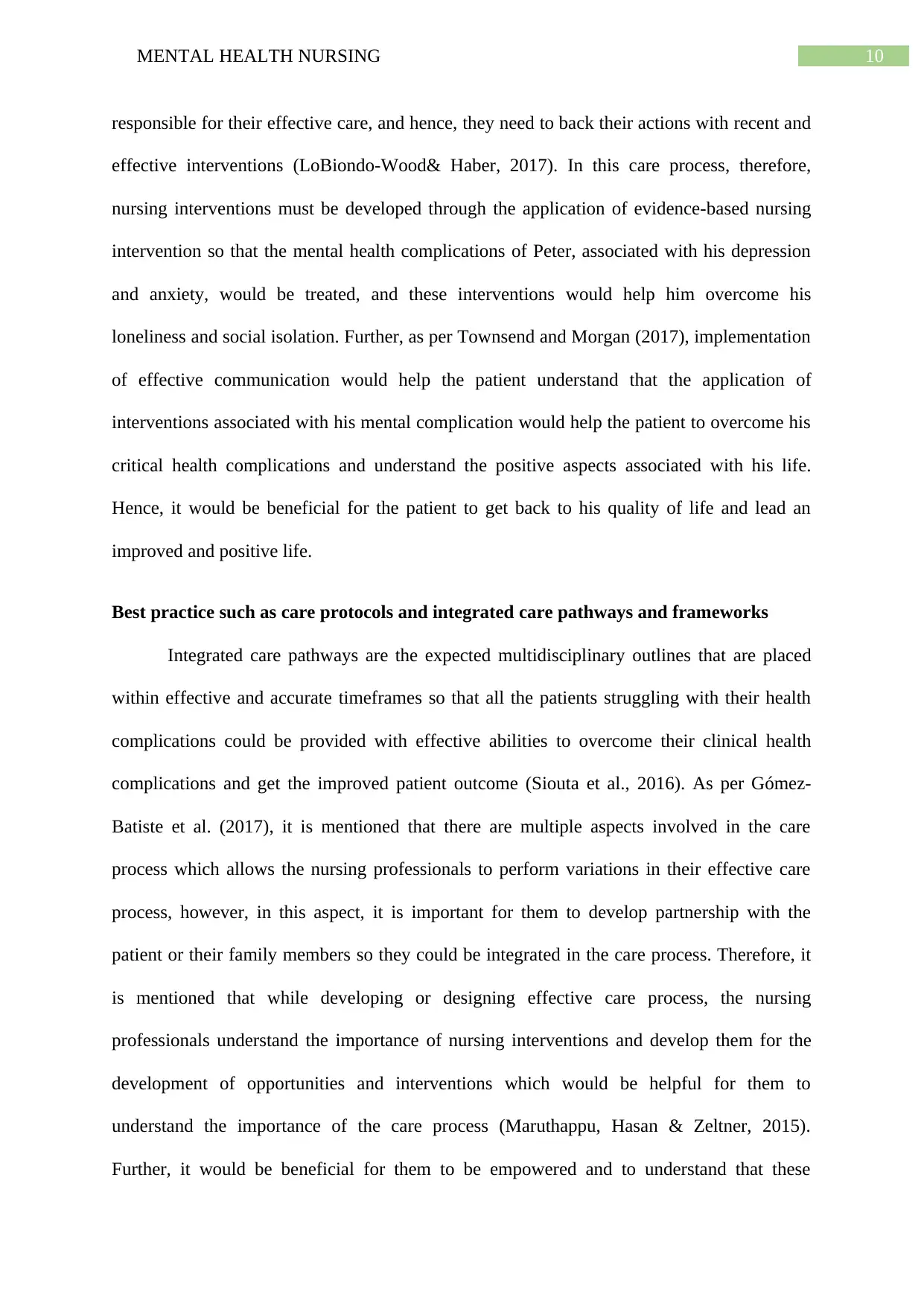
10MENTAL HEALTH NURSING
responsible for their effective care, and hence, they need to back their actions with recent and
effective interventions (LoBiondo-Wood& Haber, 2017). In this care process, therefore,
nursing interventions must be developed through the application of evidence-based nursing
intervention so that the mental health complications of Peter, associated with his depression
and anxiety, would be treated, and these interventions would help him overcome his
loneliness and social isolation. Further, as per Townsend and Morgan (2017), implementation
of effective communication would help the patient understand that the application of
interventions associated with his mental complication would help the patient to overcome his
critical health complications and understand the positive aspects associated with his life.
Hence, it would be beneficial for the patient to get back to his quality of life and lead an
improved and positive life.
Best practice such as care protocols and integrated care pathways and frameworks
Integrated care pathways are the expected multidisciplinary outlines that are placed
within effective and accurate timeframes so that all the patients struggling with their health
complications could be provided with effective abilities to overcome their clinical health
complications and get the improved patient outcome (Siouta et al., 2016). As per Gómez-
Batiste et al. (2017), it is mentioned that there are multiple aspects involved in the care
process which allows the nursing professionals to perform variations in their effective care
process, however, in this aspect, it is important for them to develop partnership with the
patient or their family members so they could be integrated in the care process. Therefore, it
is mentioned that while developing or designing effective care process, the nursing
professionals understand the importance of nursing interventions and develop them for the
development of opportunities and interventions which would be helpful for them to
understand the importance of the care process (Maruthappu, Hasan & Zeltner, 2015).
Further, it would be beneficial for them to be empowered and to understand that these
responsible for their effective care, and hence, they need to back their actions with recent and
effective interventions (LoBiondo-Wood& Haber, 2017). In this care process, therefore,
nursing interventions must be developed through the application of evidence-based nursing
intervention so that the mental health complications of Peter, associated with his depression
and anxiety, would be treated, and these interventions would help him overcome his
loneliness and social isolation. Further, as per Townsend and Morgan (2017), implementation
of effective communication would help the patient understand that the application of
interventions associated with his mental complication would help the patient to overcome his
critical health complications and understand the positive aspects associated with his life.
Hence, it would be beneficial for the patient to get back to his quality of life and lead an
improved and positive life.
Best practice such as care protocols and integrated care pathways and frameworks
Integrated care pathways are the expected multidisciplinary outlines that are placed
within effective and accurate timeframes so that all the patients struggling with their health
complications could be provided with effective abilities to overcome their clinical health
complications and get the improved patient outcome (Siouta et al., 2016). As per Gómez-
Batiste et al. (2017), it is mentioned that there are multiple aspects involved in the care
process which allows the nursing professionals to perform variations in their effective care
process, however, in this aspect, it is important for them to develop partnership with the
patient or their family members so they could be integrated in the care process. Therefore, it
is mentioned that while developing or designing effective care process, the nursing
professionals understand the importance of nursing interventions and develop them for the
development of opportunities and interventions which would be helpful for them to
understand the importance of the care process (Maruthappu, Hasan & Zeltner, 2015).
Further, it would be beneficial for them to be empowered and to understand that these
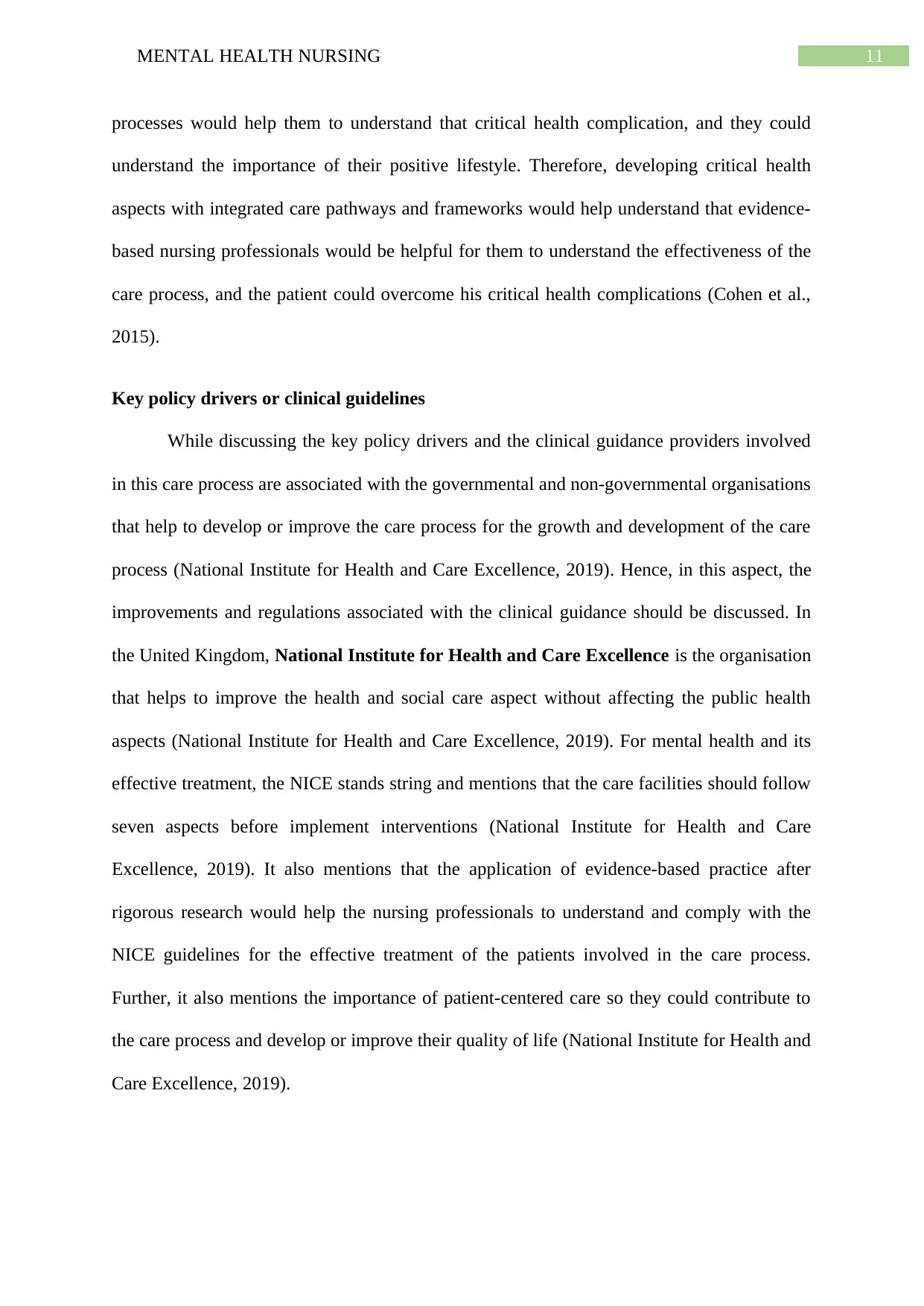
11MENTAL HEALTH NURSING
processes would help them to understand that critical health complication, and they could
understand the importance of their positive lifestyle. Therefore, developing critical health
aspects with integrated care pathways and frameworks would help understand that evidence-
based nursing professionals would be helpful for them to understand the effectiveness of the
care process, and the patient could overcome his critical health complications (Cohen et al.,
2015).
Key policy drivers or clinical guidelines
While discussing the key policy drivers and the clinical guidance providers involved
in this care process are associated with the governmental and non-governmental organisations
that help to develop or improve the care process for the growth and development of the care
process (National Institute for Health and Care Excellence, 2019). Hence, in this aspect, the
improvements and regulations associated with the clinical guidance should be discussed. In
the United Kingdom, National Institute for Health and Care Excellence is the organisation
that helps to improve the health and social care aspect without affecting the public health
aspects (National Institute for Health and Care Excellence, 2019). For mental health and its
effective treatment, the NICE stands string and mentions that the care facilities should follow
seven aspects before implement interventions (National Institute for Health and Care
Excellence, 2019). It also mentions that the application of evidence-based practice after
rigorous research would help the nursing professionals to understand and comply with the
NICE guidelines for the effective treatment of the patients involved in the care process.
Further, it also mentions the importance of patient-centered care so they could contribute to
the care process and develop or improve their quality of life (National Institute for Health and
Care Excellence, 2019).
processes would help them to understand that critical health complication, and they could
understand the importance of their positive lifestyle. Therefore, developing critical health
aspects with integrated care pathways and frameworks would help understand that evidence-
based nursing professionals would be helpful for them to understand the effectiveness of the
care process, and the patient could overcome his critical health complications (Cohen et al.,
2015).
Key policy drivers or clinical guidelines
While discussing the key policy drivers and the clinical guidance providers involved
in this care process are associated with the governmental and non-governmental organisations
that help to develop or improve the care process for the growth and development of the care
process (National Institute for Health and Care Excellence, 2019). Hence, in this aspect, the
improvements and regulations associated with the clinical guidance should be discussed. In
the United Kingdom, National Institute for Health and Care Excellence is the organisation
that helps to improve the health and social care aspect without affecting the public health
aspects (National Institute for Health and Care Excellence, 2019). For mental health and its
effective treatment, the NICE stands string and mentions that the care facilities should follow
seven aspects before implement interventions (National Institute for Health and Care
Excellence, 2019). It also mentions that the application of evidence-based practice after
rigorous research would help the nursing professionals to understand and comply with the
NICE guidelines for the effective treatment of the patients involved in the care process.
Further, it also mentions the importance of patient-centered care so they could contribute to
the care process and develop or improve their quality of life (National Institute for Health and
Care Excellence, 2019).
⊘ This is a preview!⊘
Do you want full access?
Subscribe today to unlock all pages.

Trusted by 1+ million students worldwide
1 out of 19
Related Documents
Your All-in-One AI-Powered Toolkit for Academic Success.
+13062052269
info@desklib.com
Available 24*7 on WhatsApp / Email
![[object Object]](/_next/static/media/star-bottom.7253800d.svg)
Unlock your academic potential
Copyright © 2020–2026 A2Z Services. All Rights Reserved. Developed and managed by ZUCOL.

![Mental Health Nursing Assignment: Lisa Case Study, [University Name]](/_next/image/?url=https%3A%2F%2Fdesklib.com%2Fmedia%2Fimages%2Fpe%2F5e790301b8374363b0168e51e06aa3a5.jpg&w=256&q=75)



